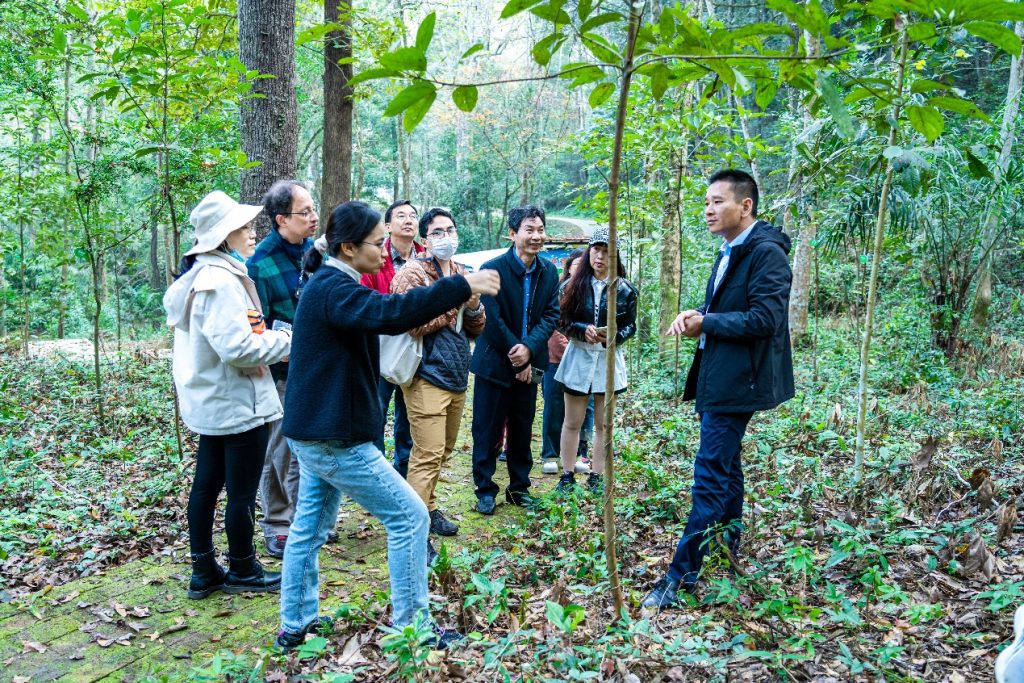L'Initiative de Restauration (TRI) ont travaillé de pionnier de la gestion durable des forêts en Chine, dans la forêt domaniale des fermes (SFFs), qui couvrent une énorme 77 millions d'hectares de paysage et d'embaucher environ 750 000 personnes. Ces forêts ont toujours été mal géré et utilisé pour un excès de récolte de bois d'œuvre, conduisant à la dégradation des sols et la fragmentation des écosystèmes. TRI du projet, mis à l'essai dans Chengde, Ganzhou, et Bijie, visant à renverser ces tendances par la mise en œuvre de la restauration des paysages forestiers (RPF) pratiques.
La Transformation De L'Etat Appartenant À Des Fermes Forestières
TRI du projet en Chine centrée autour de travail avec l'État de la Forêt Fermes (SFFs) pour élaborer et mettre en œuvre une gestion durable des forêts et des plans de restauration. Ces plans ont été conçus pour intégrer l'écologie de la forêt avec la diversification de la production au-delà du bois, visant à fournir des services écosystémiques tels que la conservation de la biodiversité, la stabilité des sols, et la séquestration du carbone. Le projet s'étend sur trois sites distincts—Chengde, dans le Hebei, dans le Jiangxi Ganzhou, et Bijie dans le Guizhou—à travers les sept appartenant à l'etat des fermes forestières.
Les principaux Jalons et de l'Impact
Sur une période de cinq ans de durée de vie, TRI du projet en Chine a abouti à d'importantes réalisations à restaurer les paysages dégradés. Le projet a été présenté avec succès une superficie totale de 229,831 hectares, en cours de restauration, avec la même incroyable montant de la masse terrestre subissant l'amélioration de la gestion. Dépassant les objectifs initiaux, ce travail de restauration a permis de grandement améliorer la santé écologique des régions, en fournissant des services écosystémiques essentiels comme l'eau potable, amélioré la productivité des sols, et l'augmentation du stockage du carbone.
L'implication et la participation active des communautés locales ont contribué de façon déterminante à la réussite du projet, avec de 63 000 bénéficiaires directs en récoltent les fruits de holistique de la restauration des écosystèmes. Ces membres de la communauté ont participé à diverses activités de renforcement des capacités, des sessions de formation et des ateliers visant à renforcer les pratiques de gestion forestière et de la promotion de moyens de subsistance durables. En équipant les habitants avec les compétences et connaissances nécessaires, le projet a favorisé un fort sens de la longévité dans l'utilisation durable des terres.
La politique de Développement et de Promesse
L'une des principales réalisations de la TRI projet en Chine a été sa contribution à l'élaboration des politiques. Le projet a facilité la création de deux politiques: la “Voie Verte à la Croissance de la Forêt d'État de la Batterie de la Politique de Recherche en Chine, dans la Nouvelle Étape du Développement Économique et Social” et la “mise en Œuvre de la feuille de route du projet Pilote de Gestion Durable des Forêts en Chine.” Ces politiques fournissent un cadre solide pour l'intégration de la RPC et de la gestion durable des forêts dans les stratégies nationales, assurer la pérennité des impacts positifs du projet.
Naturellement, le projet a toujours rencontré divers défis, tels que la nécessité d'adaptation permanente aux conditions locales et à l'intégration de FLR avec des Chinois locaux, des concepts. Pour répondre à ces défis, le projet a combiné FLR avec la “Systémique de la Gouvernance des Montagnes, des Rivières, des Forêts, des Terres agricoles, des Lacs et des Prairies” (MRFFLG) de la théorie. Cette intégration a pris en charge la localisation de FLR pratiques et a facilité leur intégration en Chine.
